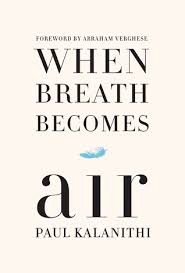When Breath Becomes Air

When Breath Becomes Air is a hard one to read, and even harder to stop thinking about. It’s an autobiographical memoir of Paul Kalanithi, a Stanford-trained neurosurgeon, who contracted stage IV metastatic lung cancer at a young age of just 35. In the 22 months left to him, Paul went through various cancer treatments, and in the end, had to confront the reality of being mortal.
The first part of the book is a story of a fiercely ambitious Paul who chose Stanford for his undergrad, got two B.A.’s and an M.A. in Literature, followed by a Master of Philosophy from Cambridge before finally graduating Yale School of Medicine and returning to Stanford for his Neurosurgery residency. Born to Indian immigrant parents who decided to settle in Arizona, Paul was mostly raised by his mother and ended up with a love-hate relationship with medicine. It was the thing that kept his father, a cardiologist, away from home at night. Like most Indian parents, Paul’s mother cared a lot about her children’s education, including literature, and worried about him getting exposed to alcohol and drugs in his teenage years, “never suspecting that the most intoxicating thing he’d experienced, by far, was the volume of romantic poetry she’d handed him the previous week.”
The next part describes a medical student transforming himself into a world-class neurosurgeon. It goes through a series of firsts for him: the first cadaver, the first birth, the first death, the first time he had to break the impossible news to the closest of the kin. Paul was almost about to graduate when the back pains started, ultimately resulting in the fatal lung cancer diagnosis. Next, without a clear idea of the time left for him to live, Paul and his wife, Lucy, struggled to make a number of decisions — Should they have a child, or would it only make it harder for him to die? Should they move to Wisconsin for them to start new careers, or would that be too far from their family and friends when Paul goes away? What should they plan for the long-term, and in the face of death, what does long-term even mean? A month, a year, five years? Paul starts on his cancer medication, gets better and then fights every living moment to regain his strength and gets back in the operating room to finish his residency.
Cancer eventually returns, and he gets started on chemotherapy this time. He becomes frail again and realizes that at this moment, what matters most to him is to die well. Lucy and Paul have a daughter, and Paul decides to double down on his long ignored passion and ambition for writing. This book is dedicated to their daughter Cady, and it is the result of Paul’s ruthless drive to write in his final days, even as the weakened skin of his fingertips ruptured from hitting the keys too much. This book is a very heavy read and will make you cry more than once. It ends with a note on tenses, finitude, time, and a message for their daughter:

What makes this book such a hard read is the realization that Paul spent his life living like most driven people do. Paul put his writing ambitions on the side, pursuing the grueling life of a medical student and a neurosurgery resident. By the time he was ready to finish his residency and enjoy a life outside the operating room, it was time for him to learn how to die.
Read this book, for it will make you grateful for what you still have and inspire you to make the most of it.
P.S: Bill Gates’ notes on this book are also worth checking out: https://www.gatesnotes.com/Books/When-Breath-Becomes-Air
This is #43 in a series of book reviews published weekly on this site.
